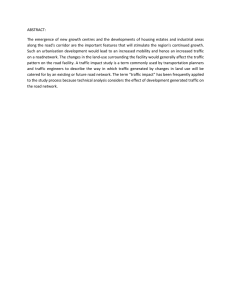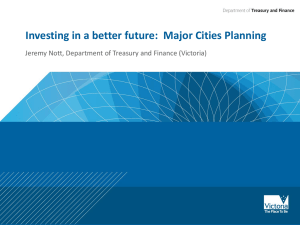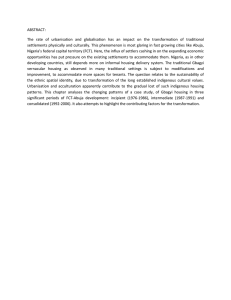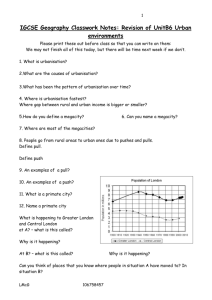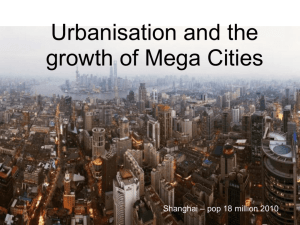delegate profiles - Connect
advertisement
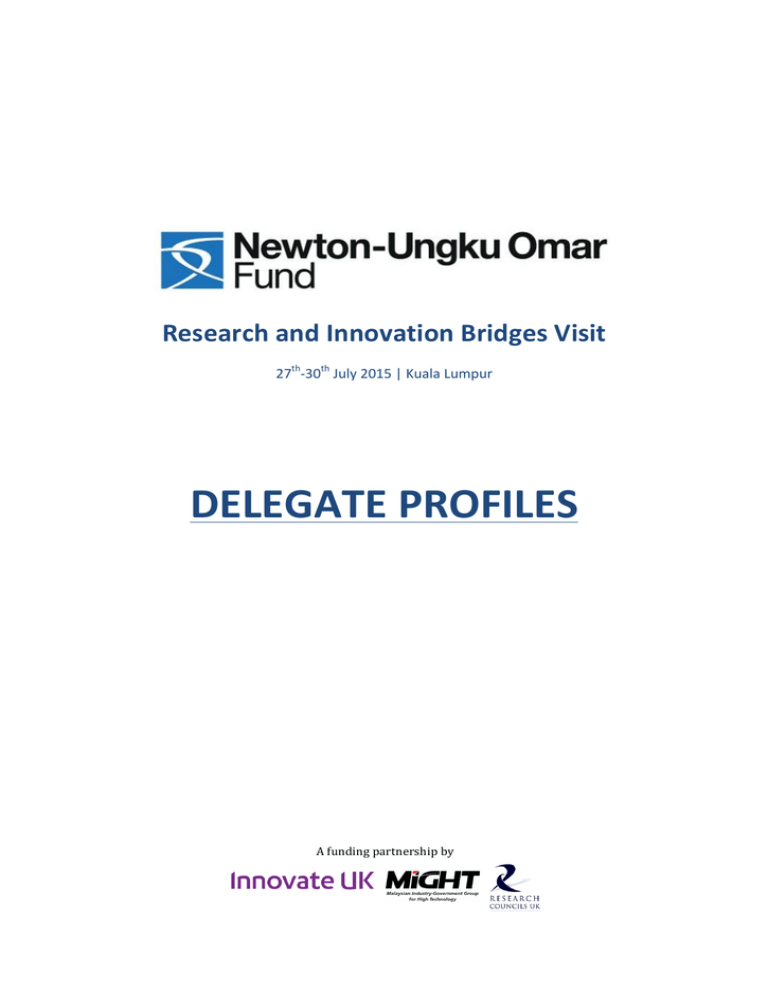
Research and Innovation Bridges Visit th th 27 -­‐30 July 2015 | Kuala Lumpur DELEGATE PROFILES A funding partnership by -­‐ UK DELEGATES -­‐ 2 Atkins Organisation type Address Large business 30th Floor Euston Tower, 286 Euston Road, London, NW13AT Contact person Roger Savage Email address roger.savage@atkinsglobal.com Telephone number +442071212980 +447802915911 Brief description of organisation competencies & innovation Atkins (www.atkinsglobal.com) is one of the world's leading design, engineering and project management consultancies, employing some 18,000 people across the UK, North America, Middle East, Asia Pacific and Europe. Our people’s breadth and depth of expertise and drive to ask why has allowed us to plan, design and enable some of the world’s most complex and time critical projects including integrated urban development projects and strategies, metro and transport systems, ports, special economic zones and housing programmes and plans as well as strategies for energy security and water resources. We have a long track record in making innovation a full part of what we do across all sectors and bring collaboration, insight, tools and thought leadership to our clients and partners. Capabilities in sustainable urbanisation sectors Our focus is on Future Cities, Environmental Resilience and Energy Security. We have worked with national governments, cities, service providers and developers to prepare and co-­‐create plans and projects for urban development, infrastructure, environmental and economic development initiatives. These respond to existing and future needs in ways which are integrated and smart and which deliver tangible economic, social and environmental benefits. We are able to bring advice on leveraging investment and developing strategies for implementation and delivery. Experience in international R&D collaboration Atkins has a significant track record in leading and supporting collaborative research and innovation working with national government, city authorities, private sector partners, civil society and academia. Examples include our global work on Future Proofing Cities; development and application of eco-­‐low carbon standards for urban development in China; using mobile phone data to assist transport planning and urban management; working in India to develop with city, state, civil society and UK academic partners strategies for future proofing cities; working with energy companies in Nigeria to explore mechanisms for selecting and applying low carbon technologies; hosting a platform with the Carbon Trust for roll out of low carbon technologies in the UK; working with the World Resources Institute to develop solutions to address water-­‐energy nexus challenges; developing low carbon tools focused for the transport sector in Bahrain; and working with national development bank and city partner in Colombia to develop a sub-­‐regional planning framework and urban regeneration model to catalyse economic development. In Malaysia most recently with the World Bank we supported the Ministry of Transport with the National Transport Masterplan. Top 3 sustainable urbanisation areas in the Newton-­‐Ungku Omar of interest. Health and life sciences 1 Future cities Digital innovation and creativity Agricultural technology 2 Environmental resilience and energy security 3 University of Cambridge Organisation type University Address Electrical Engineering Div, 9 JJ Thomson Ave Contact person Arokia Nathan Email address An299@cam.c.uk Telephone number +44 (0)1223 748302 Brief description of organisation competencies & innovation The University of Cambridge (UCAM) is one of the internationally leading institutions in the field of materials for electronics and sensing applications. The Electrical Engineering Department consists of over30 faculty, 25 administrative and technical support staff, 80 post-­‐doctoral research associates and over 170 research students. The Hetero-­‐Genesys Laboratory in the Electrical Engineering Department, is a multi-­‐ disciplinary research environment whose primary focus is on the heterogeneous integration of materials and processes, sensors, energy harvesting and storage devices including wireless power, thin film signal processing electronics and RF wireless communication pertinent to large area nanosystems. This laboratory has world-­‐leading expertise in the design and system integration of thin film electronic technologies. Capabilities in sustainable urbanisation sectors The Hetero-­‐Genesys Laboratory is part of a recently awarded EPSRC Centre for Innovative Manufacturing in Large Area Electronics and is headquartered in Cambridge University. The Centre is developing scalable processes for multifunctional integration of printed electronic systems for a number of reusable building blocks, which can be integrated for a range of smart healthcare systems, linked wirelessly and serving as the hardware gateway to the emerging Internet of Things (IoT). Our printed electronics framework will utilize much of the expertise in carbon based organic and inorganic materials as the basis for printed systems for active health monitoring. Experience in international R&D collaboration We have a long history of international collaborations especially with countries in the Far East with a number of centres and institutes with a specific research focus that is beneficial to the needs of the country in question. Cambridge engages with peer institutions, governments, NGOs and policy-­‐ makers around the world to translate the results of its research for the benefit of society. We are also a member of the International Alliance of Research Universities enabling it to share best practice with peer institutions around the world. Top 3 sustainable urbanisation areas in the Newton-­‐Ungku Omar of interest 1 Health and life sciences Future cities 2 Digital innovation and creativity Agricultural technology 3 Environmental resilience and energy security 4 Costain Group plc. Organisation type Address Large Business (Tier 1 EPC Contractor) Costain House, Vanwall Business Park, Maidenhead, Berkshire SL6 4UB Contact person Oliver Teall Email address Oliver.Teall@Costain.com Telephone number +44 (0)7807 273598 Brief description of organisation competencies & innovation Costain is one of the UK’s leading engineering solutions providers, working across the highways, rail, water and energy sectors. We provide innovative engineering and technology-­‐led solutions to meet the needs of our customers. The company was founded in Liverpool in 1865 and now has over 3,300 employees working across the UK. We offer advisory and concept development, specialist design, programme management, complex project delivery, technology integration and asset optimisation and support. The company’s reported revenues for the financial year ended 31 December 2014 was £1.1Bn. Capabilities in sustainable urbanisation sectors Our current projects deliver infrastructure for the UK’s current and future needs. The development of intelligent solutions within infrastructure is key to the future cities agenda, and we are continually looking to deliver more innovative solutions within our sectors. We also engage in front-­‐end design within the energy sector, providing new technologies to ensure our energy supply is resilient and sustainable. Experience in international R&D collaboration Costain are the principal sponsor of the Materials for Life programme, a £2m collaborative research programme involving Cardiff, Bath and Cambridge Universities and funded by the Engineering & Physical Sciences Research Council. Costain have given £600,000 in in-­‐kind contribution to the research, which includes staff time and resources as well as the provision of live UK construction projects for the purposes of trialling the developed material. Costain are also supporting 7 PhD students at universities throughout the UK as part of our growing research agenda, focussing on the areas of advanced materials, technological enablers, process improvements and future services. We constantly drive our supply chain to improve and to innovate through our supply chain innovation system. This system allows us to view and advance the new products and services offered by our supply chain, actively identifying sites on which to trial these innovations to accelerate them to market. Top 3 sustainable urbanisation areas in the Newton-­‐Ungku Omar of interest Health and life sciences 1 Future cities 2 Digital innovation and creativity Agricultural technology 3 Environmental resilience and energy security 5 Dearman Engine Organisation type Small Business Address 7 Henrietta Street, London, WC2E 8PS, UK Contact person Dr Tim Fox Email address tim.fox@dearmanengine.com Telephone number +44 (0)7468 599980 Brief description of organisation competencies & innovation Dearman is focussed on commercialisation of our novel, zero-­‐emissions, cryogenic engine technology through collaborative R&D translation, as well as techno-­‐economic analysis and innovative business model development for its successful application. The technology is an innovative piston engine ‘fuelled’ by liquid nitrogen (or air) and efficiently produces mechanical power, electricity and cooling. Applications under commercial development include for transport refrigeration and air-­‐conditioning, auxiliary power provision and a diesel generator replacement. Capabilities in sustainable urbanisation sectors Dearman helps reconcile urbanisation and economic growth with climate change and sustainability by delivering zero-­‐emissions power and cooling and improves energy security through reducing diesel dependence and harnessing renewable energy. Rapid urbanisation coupled to rising incomes is expected to lead to increased cooling demand in the form of static and mobile refrigeration (cold chain) for safe and nutritious food supply and medical services, as well as in building and transport air-­‐conditioning to meet higher expectations of comfort. If this rising demand is satisfied using conventional fossil fuel technologies the cost will be worsening public health through poorer air quality, increased climate risks and energy insecurity. Dearman’s techno-­‐economic capabilities and commercially viable engine applications can help avoid these outcomes and contribute to improved urban resilience and citizen well being in future cities. Experience in international R&D collaboration Dearman has extensive experience of UK R&D collaboration (we are partnered on 3 Innovate UK IDP projects, in 2 of which we are lead partner) with a wide range of industrial and research organisations including Air Products, Zanotti, MIRA, MTC, Productiv, Loughborough University and Birmingham University. A recently won Innovate UK POC grant has begun to examine the use of waste cold from LNG regasification in liquid nitrogen production and will includes relationships with stakeholders in Singapore, India and Spain. We have also worked extensively with the NCCD in India and Postharvest Education Foundation in USA on techno-­‐economic modelling. Top 3 sustainable urbanisation areas in the Newton-­‐Ungku Omar of interest 1 Health and life sciences 3 Digital innovation and creativity 2 Environmental resilience and energy security 6 Future cities Agricultural technology The University of Essex Organisation type University Address Wivenhoe Park, Colchester CO4 3SQ, UK Contact person Professor Abdellah Salhi Email address as@essex.ac.uk Telephone number +44 (0)1206 873022 Brief description of organisation competencies & innovation • Mathematical modelling, Agent-­‐based simulation • Optimisation research, Big data • Software development • Internet of things (Consortium, University level) • Commercial exploitation of research outputs Capabilities in sustainable urbanisation sectors We have undertaken several projects under the Sustainable Future Cities theme involving: 1) modelling interactions between different city agents (stakeholders), integrating data from different sources including smart devices, and analysing it to allow for more accurate predictions and better decision making; 2) optimisation in Logistics, reducing carbon footprint of operations in transportation; 3) modelling animal movement for health monitoring, the case of dairy cows; optimum deployment of honeybees and wild pollinators for better pollination and yield improvement for food security. Experience in international R&D collaboration The University of Essex has substantial experience in managing international projects. It was awarded over 100 projects sponsored by the European Commission through EU FP7 and EU H2020 research and innovation programmes. The University has extensive academic links with Malaysia across several departments which span both staff and student populations through exchanges, collaborative R&D and other scholarship activities. We are also engaged in R&D collaboration with several other countries such as China, India, Mexico, South Africa, Singapore and other countries. Top 3 sustainable urbanisation areas in the Newton-­‐Ungku Omar of interest Health and life sciences 1 Future cities 2 Digital innovation and creativity 3 Agricultural technology Environmental resilience and energy security 7 Integrated Environmental Solutions (IES) Organisation type Address Medium Business Helix Building, West of Scotland Science Park, Glasgow, G20 0SP Contact person Ruth Kerrigan Email address ruth.kerrigan@iesve.com Telephone number +44 (0)141 945 8540 Brief description of organisation competencies & innovation Less than 20 years ago, IES developed technology to allow buildings to be ‘simulated’ to predict how to reduce energy and water consumption. For well over a decade this technology has been used by many of the world’s leading building design and contracting companies to substantially reduce energy consumption in buildings and the IES <VE> is now one of the world’s leading software for Dynamic Simulation Modelling of Buildings. In the last 5 years, IES have expanded our suite of software tools to include capabilities for energy retrofit of buildings, integration of renewables, Measurement and Verification (M&V) and Fault Detection and Diagnosis (FDD) for buildings in-­‐use and most recently software for masterplanning of cities. Capabilities in sustainable urbanisation sectors The IES suite of existing and new innovative software tools all form part of the IES Smart Community Lifecycle (SCL). IES has not only developed the concept of a virtual masterplan as the foundation of a continued managed process; but we also have the research, technology and expertise to start implementing it. Importantly, the IES SCL process is scalable to any size of ‘community’. The process has four key elements: (1) Masterplanning, (2) New Design and/or Retrofit of buildings, (3) Improved Building Operation and (4) Smart Communities. Through IES technology it is possible for a ‘Smart Community’ to prove its sustainability credentials. IES is currently working closely with a large group of global industry experts, such as Gensler, ESRI (ArcGIS) and Siemens Ag to enhance our capability within the SCL process. Experience in international R&D collaboration IES has experience with 24 R&D projects, both through UK and EU funded programmes. We are involved in 15 on-­‐going EU projects through funding streams such as FP7 and H2020 and have seen through to completion 9 R&D projects through the EU, UK (TSB and SBRI) and Smart: Scotland. We have coordinated 6 projects, 4 of which are ongoing and 2 of which have led to successful marketable products. IES R&D is a large part of our business as it has allowed the business to grow and develop in new and emerging markets during a time of recession. Top 3 sustainable urbanisation areas in the Newton-­‐Ungku Omar of interest Health and life sciences 1 Future cities Digital innovation and creativity Agricultural technology 2 Environmental resilience and energy security 8 University of Leeds Organisation type University Address Woodhouse Lane, Leeds, LS2 9JT Contact person Penny Cunningham Email address P.J.Cunningham@Leeds.ac.uk Telephone number +44 (0)113 343 609 Brief description of organisation competencies & innovation Leeds University is in the top 10 for research power in the UK and in the top 100 Universities in the world. Our research strengths are in areas such as energy, cities, climate and geohazards, water, transport systems, biomedical engineering, advanced electronic devices, condensed matter physics and medical technologies. The University has implemented a dynamic ‘Theme’ approach to working with the wider world, creating interdisciplinary centres of excellence which form a gateway to the University’s expertise across 7 identified areas of strength. Leeds’ has a strong reputation for innovation, with 101 spin outs since 1995 with 7 companies listed with a market value of c£400m. Capabilities in sustainable urbanisation sectors As a Russell group UK university we have developed a sustainable urbanisation specialism which includes a wide range of specialisms. For example, it includes engineers (e.g. infrastructure, energy, transport, waste, water), social scientists, business and environmental experts. Current research projects of particular interest include our Climate Smart Cities programme, which has looked at low carbon opportunities in 10 global cities identifying the potential of up to US$16.6 trillion of low carbon urban investment by 2050 and the UK iBUILD programme, which brings together engineering, economic and social science expertise to understand infrastructure financing, valuation and interdependencies under a range of possible futures. Experience in international R&D collaboration Leeds is a founding member of the Worldwide Universities Network (WUN) which comprises 18 research-­‐intensive institutions spanning six continents. Leeds also has links with over 300 institutions worldwide. Leeds has successfully been awarded international R&D funding worth £67.5m (2009-­‐2014). Top 3 sustainable urbanisation areas in the Newton-­‐Ungku Omar of interest 2 Health and life sciences 1 Digital innovation and creativity Environmental resilience and energy security 9 Future cities Agricultural technology Loughborough University CREST Organisation type University Address CREST, Holywell Park, Loughborough, LE11 3TU Contact person Dr Richard Blanchard Email address r.e.blanchard@lboro.ac.uk Telephone number +44 (0)1509 227190 Brief description of organisation competencies & innovation Loughborough University is continually ranked in the top 15 of UK universities. It is well known for research, teaching and enterprise in engineering, business, science and sport. Loughborough works closely with industry including many international blue chip companies. We have received seven Queen’s Anniversary Prizes for Excellence, the 2nd most awarded. Capabilities in sustainable urbanisation sectors For environmental resilience, energy security and future cities, CREST (Centre for Renewable Energy Systems Technology) at Loughborough is world-­‐class with one of the largest concentrations of academic endeavour in the UK. Work spans the generation, supply and demand for energy and includes: the invention and improvement of new and renewable energy technologies; the efficient and flexible generation of power; electrical and thermal energy storage; the efficiency of conventional transport systems; transport and travel; and end-­‐use energy demand in buildings and for travel. Work is often applied and multi-­‐disciplinary drawing together scientists, engineers, social scientists and economists to address contemporary energy research challenges. Theoretical and fundamental work is advanced via extensive and expanding laboratory and field test facilities, and through collaboration with internationally leading research groups and industrial sponsors. In addition, we work in changing environments and infrastructure to address challenges such as the growing scarcity of water resources, environmental pollution, and the repercussions of climate change, including the risks posed by natural hazards. This requires not only scientific understanding of the underlying environmental processes, but also of how change impacts the built infrastructure and its operation, which supports the health and well-­‐being of people, societies and economies. Experience in international R&D collaboration Personally I am working on Bridging the Urban Rural Divide project for hybrid renewable energy with India (RCUK). Also a UKIERI project on biogas with India. In addition, a DfID / EPSRC project for micro-­‐grids in Kenya and Bangladesh. Colleagues in CREST are working with Malaysia on a Newton Fund photovoltaic project. CREST has experience of working around the world on R&D projects. 95% of Loughborough University’s research activity is classed as internationally leading. Top 3 sustainable urbanisation areas in the Newton-­‐Ungku Omar of interest 1 Health and life sciences 2 Digital innovation and creativity Environmental resilience and energy security 10 Future cities Agricultural technology Loughborough University Chemistry Department Organisation type Address University Department of Chemistry, Loughborough University, LE11 3TU, UK Contact person Professor Upul Wijayantha Email address U.Wijayantha@lboro.ac.uk Telephone number +44(0)1509 222574 Brief description of organisation competencies & innovation Loughborough University is continually ranked in the top 15 of UK universities, and well known for research, teaching and enterprise in engineering, business, science and sport. We work closely with industry including many international blue chip companies. We have received Queen’s Anniversary Prize for Excellence 7 times and the 2nd most recipient. 95% of Research conducted in Loughborough University is classed as internationally leading. Capabilities in sustainable urbanisation sectors For environmental resilience, energy security and future cities, energy research at Loughborough is world-­‐class with one of the largest concentrations of academic endeavour in the UK. Work spans the generation, harvesting, storage, supply and demand for energy and includes: the invention and improvement of new & renewable energy technologies; the efficient and flexible generation of power; electrical and thermal energy storage; the efficiency of conventional transport systems; transport and travel; biogas; advanced catalysts; low-­‐cost generation of energy vectors (i.e. hydrogen, ammonia). Work is often applied and multi-­‐disciplinary drawing together scientists, engineers, social scientists and economists to address contemporary energy challenges. Theoretical and fundamental work is advanced via extensive and expanding laboratory and field test facilities, and through collaboration with internationally leading research groups and industrial sponsors. Also we work to address the growing scarcity of water resources, environmental pollution, and repercussions of climate change, including the risks posed by natural hazards. This requires scientific understanding of the underlying environmental processes and also of how change impacts the built infrastructure and its operation, which supports the health and well-­‐being of people, societies and economies. Experience in international R&D collaboration I am the lead academic of Energy Research Laboratory (ERL) and the Director of Research in Loughborough Chemistry. ERL works closely with Loughborough CREST. R&D work conducted at ERL encompasses many areas listed above and often sponsored by industry. I have worked both in academia and industry in Asia, US and UK. I have held a portfolio of international R&D collaboration projects (i.e. with Japan, Pakistan, Turkey, Qatar). I have very active R&D collaborations with Malaysian partners over the last 6 years (i.e. 14 joint high-­‐impact publications, 4 invited talks in Malaysia, PhD examinations, PhD student supervisions). Top 3 sustainable urbanisation areas in the Newton-­‐Ungku Omar of interest Health and life sciences 2 Future cities Digital innovation and creativity 3 Agricultural technology 1 Environmental resilience and energy security 11 Oxford Brookes University, Low Carbon Building Group Organisation type Address University Low Carbon Building Group, School of Architecture, Headington Campus, Gipsy Lane, Oxford, OX3 0BP, United Kingdom Contact person Prof Rajat Gupta / Dr Adorkor Bruce-­‐Konuah Email address rgupta@brookes.ac.uk nbruce-­‐konuah@brookes.ac.uk Telephone number +44 (0)1865 484049 / +44 (0)1865 485605 Brief description of organisation competencies & innovation The Low Carbon Building (LCB) Research Group of Oxford Institute for Sustainable Development (OISD) at Oxford Brookes University has led R&I initiatives nationally and internationally. LCB Group is a global leader in the fields of carbon mapping and building performance monitoring, advanced low carbon refurbishment, climate change adaptation and low carbon communities. Since 2008, LCB group has attracted £8m external research funding from EPSRC, ESRC, Innovate UK, EU, including a £1.14 million RCUK funded 4.5-­‐year project on evaluating impacts of low carbon communities (EVALOC). LCB’s EPSRC funded Suburban Neighbourhood Climate Change Adaptation (SNACC) project influenced Government reports on overheating in housing. LCB group has also been lead academic partner in over 25 Innovate UK funded projects. Capabilities in sustainable urbanisation sectors LCB group capabilities in sustainable urbanisation sectors include ‘Improving environmental resilience and energy security’, ‘future cities’ and ‘digital innovation and creativity’. LCB group’s DECoRuM model brings together disciplines of spatial mapping, energy modelling with climate science to rapidly and accurately measure, model, map, manage and track energy-­‐related carbon emissions and overheating risk on an individual building, street, district, sub-­‐urban and city scale. COBWEB is an interactive web-­‐based building energy data platform and engagement tool for promoting carbon reductions to a range of users, with the capability to rapidly REPORT, spatially MAP and TRACK ‘real-­‐time’ energy usage in domestic and commercial buildings. Experience in international R&D collaboration Internationally, the Low Carbon Building group are partners in major EU funded Horizon 2020 projects, a €1m, 2.5 year ‘HERON’ project on forward looking socio-­‐economic energy efficiency policy and a €3.56 million, 4 year ‘Zero Plus’ project on positive energy settlements. Prof Rajat Gupta has been an expert consultant to UNEP, UN-­‐Habitat, UNFCCC and World Bank. He recently published a report for the UN-­‐Habitat on Greening Social Housing (nearly 2900 downloads worldwide) and has collaborated with Malaysia Green Building Confederation to pilot test Carbon Metric tool. Top 3 sustainable urbanisation areas in the Newton-­‐Ungku Omar of interest Health and life sciences 2 3 Digital innovation and creativity 1 Environmental resilience and energy security 12 Future cities Agricultural technology Queen’s University Belfast / Green Lizard Technologies Organisation type Address Small Business (University spinout) Queen’s University Belfast, Rm 02.102c, David Keir Building, 39 -­‐123 Stranmillis Road, Belfast, N. Ireland, UK BT9 5AG Contact person Ms Fiona Blakley Email address f.blakley@qub.ac.uk Telephone number +44 (0) 2890 97 5575 Brief description of organisation competencies & innovation Queen’s University and its spin-­‐out company GLT have broad capabilities in sustainable technologies and innovative solutions for industrial and societal problems. We have an excellent balance of Academic excellence combined with over 30 years of industrial experience in the Oil, Gas and Chemicals sectors. We have a proven track record in taking innovation from the laboratory scale to commercial deployment, recent examples being the 2014 triple ICHEME medal winners for sustainable development and chemical process of the year for Hg removal. Capabilities in sustainable urbanisation sectors We have long and extensive collaborations with the leading thinkers in Asia on cities of the future and have been personally involved with the China Clean Energy Facing the Future and Clean Energy Commercialisation Centre in Shanghai for a number of years looking at integrated options for energy and waste management/recycling in the mega city concepts. We have a strong university academic team with proven innovation and excellence in the UK and several key patents/technologies within our portfolio including plastics recycling, energy storage, CO2 abatement and conversion, new (urban) fuels and chemicals from biomass. Experience in international R&D collaboration Queen’s has an extensive and successful track record in working with Industry in many sectors such as catalysis, separations, materials, health care, oil and gas, biotechnology, chemicals and speciality chemicals. Many of our industrial relationships span consortia activities, EU collaboration consortia and many specific partnerships with Industry. Our spin-­‐out company, GLT operates at the interface with Academic and Industrial application and has global networks and partnerships in place in many of the critical issues concerned with growing urbanisation and the challenges for waste to added value products, clean energy solutions and biomass. Top 3 sustainable urbanisation areas in the Newton-­‐Ungku Omar of interest 1 Health and life sciences 3 Digital innovation and creativity 2 Environmental resilience and energy security 13 Future cities Agricultural technology ST2 Group Ltd Organisation type Address Contact person Email address Small Business 30 Crown Place, London, EC2A 4EB, UK Anne Stokes; Terry Barndon Anne.stokes@st2group.com Terry.barnden@st2group.com Telephone number Anne +44 (0)7939 111 461 Terry +44 (0)7875 000568 Brief description of organisation competencies & innovation ST2 Group brings together power, energy, technology and construction capabilities under a single team to address some of the basic issues and challenges that the global and local environments face today-­‐ job creation; wealth creation; sustainable and green power generation; waste management and security. Using proven methods and technologies but in innovative ways we reduce the impact of power and technology use on the planet and thereby reduce the total life cost of the enterprise. Capabilities in sustainable urbanisation sectors Environmental resilience and energy security Future cities Digital innovation and creativity Experience in international R&D collaboration The members of ST2 Group have extensive experience in international research and development collaboration but also, the commercialisation of the concepts and subsequent delivery. ST2 Group brings together innovation and collaboration from not only across the United Kingdom but also on a Global stage. Top 3 sustainable urbanisation areas in the Newton-­‐Ungku Omar of interest Health and life sciences 3 Future cities 2 Digital innovation and creativity Agricultural technology 1 Environmental resilience and energy security 14 Sunamp Ltd. Organisation type Address Small Business 1 Satellite Park, Macmerry, East Lothian, EH33 1RY, UK, Contact person Dr David Oliver Email address David.Oliver@Sunamp.co.uk Telephone number +44 (0)1875 610001 (office) +44 (0)7792 187490 (mobile) Brief description of organisation competencies & innovation Sunamp specialise in thermal energy storage, and by connection; all aspects of heating and air conditioning systems including heat pumps and micro-­‐CHP, peak shaving of electrical grids, installation of new storage products within dwellings and materials science, particularly thermal characterisation. Sunamp have patents on; heat battery systems, construction and manufacture and two for storage materials in collaboration with Edinburgh University chemistry department. Capabilities in sustainable urbanisation sectors Thermal energy accounts for the majority of final energy use worldwide. The ability to store heat or cool results in very significant peak shifting, as demand is highly variable. Commercial adoption of Sunamp’s heat batteries for hot water are advancing in the UK. Current interest for Sunamp products are based on three scenarios: compact off-­‐peak electrical thermal storage, direct integration of intermittent renewables to store heat (e.g., solar, wind) and increasing the efficiency of current technologies by thermally buffering the demand. Experience in international R&D collaboration Sunamp have collaborated on projects with only European universities/businesses as yet. Top 3 sustainable urbanisation areas in the Newton-­‐Ungku Omar of interest 1 Health and life sciences 2 Digital innovation and creativity Environmental resilience and energy security 15 Future cities Agricultural technology Transport Systems Catapult Organisation type Address Research Organisation The Pinnacle, 170 Midsummer Boulevard, Milton Keynes, MK9 1BP, United Kingdom Contact person Dr Andrew Traill Email address andrew.traill@ts.catapult.org.uk Telephone number +44 (0)1908 35 99 99 Brief description of organisation competencies & innovation Transport Systems Catapult (TSC) is an elite technology and innovation centre established in 2013 by Innovate UK to promote Intelligent Mobility (IM). TSC’s remit is to help UK businesses create products and services to meet the needs of the world's transport systems. Its 4 Business Units (BUs) cover: • Automated Transport Systems working on the delivery and demonstration of driverless vehicles, seamlessly integrating with other transport modes and users. • Customer Experience finding new ways to measure, monitor and improve transport users’ experience. • Modelling & Visualisation to analyse/present information for evidence-­‐based decision-­‐making. • Information Exploitation looking to exploit large datasets generated by ITS and users to inform policies, optimising journeys and enabling development of new technologies, products and services. Capabilities in sustainable urbanisation sectors Modern cities need to become ‘smart’ cities in order to cater for the most efficient and environmentally sustainable movement of goods needed to support ever-­‐larger urban populations. TSC has the experience and knowledge, and expanding expert-­‐networks with industry and academia, to unlock the latent capacity within all transport networks and services. We possess specialist logistics knowledge (including within the urban environment), systems engineering and data management expertise. Specialists in transport automation combined with expertise in customer experience and support from our modelling capabilities, ensures TSC is well-­‐ equipped to finding intelligent mobility solutions to support sustainable urbanisation. Experience in international R&D collaboration TSC was only created in 2013 and officially launched in June 2014; therefore, our direct engagement in international R&D has to-­‐date been limited. TSC is a participant in ERTICO's ITS Observatory (Horizon 2020 funding) and preparing a joint workshop on urbanisation with the Federal University of Rio de Janeiro. We are also in discussion with Malta Air Traffic Services to expand our (UK-­‐funded) Departure Planning Information project to Malta and exploring collaboration with the Fraunhofer Institute and an SME, Innovative Compliance Europe, on trust in modern logistics. Top 3 sustainable urbanisation areas in the Newton-­‐Ungku Omar of interest Health and life sciences 2 Future cities 1 Digital innovation and creativity Agricultural technology 3 Environmental resilience and energy security 16 University College London / Inst. of Civil Engineers Organisation type University, Professional Body Gower Street, London, WC1E 6BT, UK Address Contact person Professor Tim Broyd, FREng, FICE Email address tim.broyd@ucl.ac.uk Telephone number +44 (0) 7802 795093 Brief description of organisation competencies & innovation UCL – World top-­‐5 university, established in 1826. Top rated UK university for research strength. 6,000 academic/research staff and 36,000 students, from 150 countries. ICE – World’s oldest Professional Engineering Institution, founded 1818 with currently 85,000 members, 25% of whom are outside UK (>1,000 in Malaysia). Professional qualifications, lifelong learning and a range of evidence-­‐based products and services. Capabilities in sustainable urbanisation sectors UCL – A very broad range of capabilities across all parts of the Built Environment and Infrastructure sectors. ‘Sustainable Cities’ is one of four Grand Challenges that cut across all of UCL’s 11 Faculties. Considerable experience in energy demand reduction, systems approaches to buildings and infrastructure, building and infrastructure economics, etc. ICE – Development of world leading techniques for assessing the sustainability of infrastructure projects. Guidance on development of low-­‐carbon infrastructure, city-­‐scale decarbonisation, etc. Experience in international R&D collaboration UCL – Substantial. Examples include working at city-­‐scale with eg Singapore, Christchurch (NZ), Sydney, etc on systems approaches to economic infrastructure (energy, water, waste, transport, ICT), working with Tsinghua University (Beijing) on combined monitoring/systems modelling of indoor environmental quality of different types of buildings, working at EU scale on deployment of sustainable lighting systems, etc ICE – Considerable experience of working with national engineering institutions around the world on a wide variety of sustainable infrastructure topics. Top 3 sustainable urbanisation areas in the Newton-­‐Ungku Omar of interest Health and life sciences 2 Future cities 3 Digital innovation and creativity Agricultural technology 1 Environmental resilience and energy security 17 -­‐ MALAYSIAN DELEGATES -­‐ 18 19
